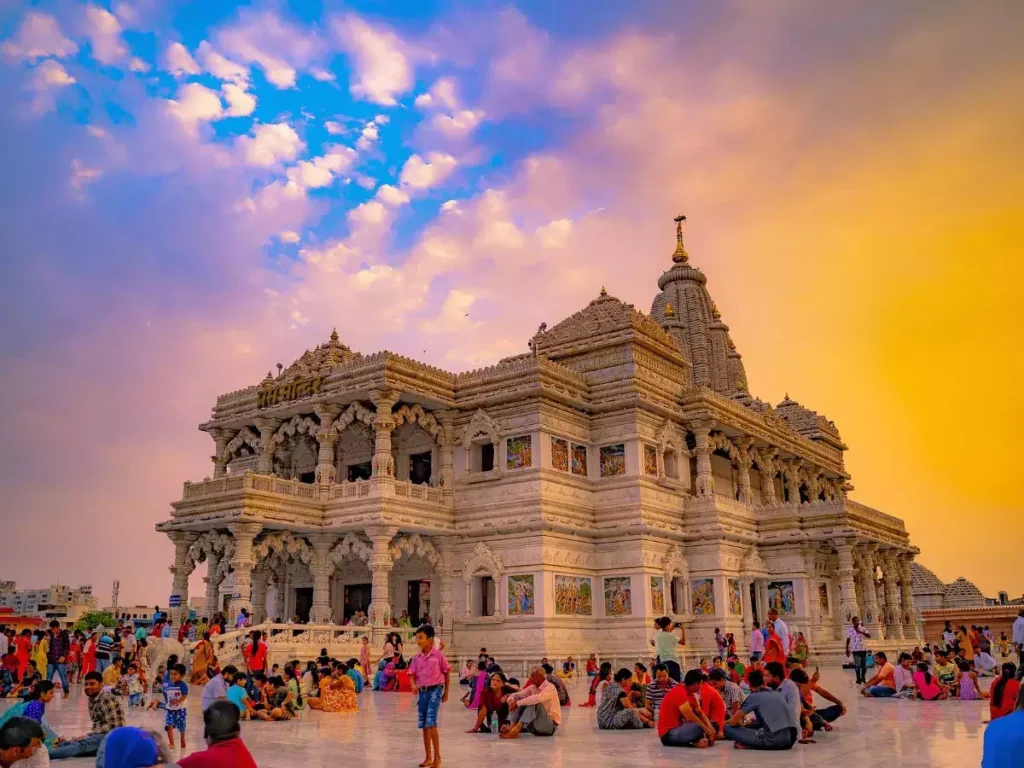What is Temple?
- What is Temple? The temple is a religious place where we go for the prayer of God. It’s a holy place and dedicated to a deity.
- In India, there are different types of religion and they also have different religious places, in which they believe. And they called it by different names. As Hindu called it a mandir, Muslims called it Masjid, Sikh people called it Gurudwara, and Christians called it Church.
- They called their deity by different names. Hindu called it God, Muslims called it Allah, Sikh called it Wahe Guru/ Baba Ji and Christians called it Jesus.
- It is a holy place where people forget their difference and autocratically unite to serve society.
- According to Indian tradition, a townlet or an area without a mandir is like a desolate place. It isn’t just a joint place, but also a home of God.

Why Should we go to Temple?
- Everyone has stress in life. And our brain is also restless. Our brain is like a wind which we can’t control. So staying focus on life and our meaning, relieving stress, for controlling our mind we must go to the mandir. Mandir is the place where we find peace. In the temple, we forget the stress of our life. It all happens because of the milieu of the mandir. Every people goes shrine for the same reason, “ For the Idolatry of God”. And it becomes easy for everyone to concentrate on worshipping because everyone has the same reason. The sanctum gives us the power to faith in god.
- A major reason for going sanctum is to get a sign and relief of resources. Whenever we face a problem in our life we need someone who really believes in us and nowise leaves us alone in a spiny situation. And we also knew that there are a lot of people around us, but the fact is in that condition we still believe that God is with us. And he’ll help us and will give a shaft of the substitute to work the problem. There are some reasons that why we should go to the temple.
- Positive Energy: Visiting the shrine gives us positive energy. It gives a fresh feeling to our mind and body. All the idleness and cerebral stress are gone relieved after going to the mandir. The ambient of the mandir creates such a type of positive energy that we forget all our problems, cerebral stress and get busy with the mandir’s conditioning like pooja, attending bhajan.
- Mind Concentrate: The reason for going mandir is you can control and concentrate on your mind. Because it has a silent ambient and you can also learn from presently that how you can concentrate on belongings. The ambient of the sanctuary builds the absorption power of the brain.
- Hope: The major reason for going to the shrine is to get relief and find some hope.
Temple/Shrine Meaning for people
- In the Russian language, as in other Slavic languages, the general word for church is Zarkov and the term khram is used to refer to a church or temple (khram bozhy). Most Christians call their place of worship a church, but many religions use “temples,” a word derived from the English and Latin words of the time, which was important to the Romans, as an appropriate time for sacrifice. The Book of Mormon, the last saint believed to accompany the Bible, refers to a temple built in ancient America by a group of people called Nephites.
- The word “temple” is also used in the tradition of Oriental Christianity and the Oriental Orthodox Church, where the most important words are the house of God, temple, and church. The Spaniards distinguish between a temple, a physical building for religious activities, and a church, which is the physical building of religious activities for a community of religious followers. The use of the word temple arises from the need to distinguish between the construction of a church and the church as seen in the body of Christ.

Benefits of Visiting Temple
- Spiritual growth and connection: Temples are often seen as sacred spaces, dedicated to a particular deity or spiritual practice. Visiting a temple can provide an opportunity for prayer, meditation, and reflection, which can help individuals to connect with their spirituality and feel a sense of peace and inner calm.
- Reduced stress and anxiety: The calming atmosphere of a temple, with its quiet surroundings and focus on spirituality, can help to reduce stress and anxiety. The repetitive nature of some rituals, such as chanting or prayer, can also be meditative and help to focus the mind.
- Increased sense of community: Temples can be important social hubs, where people come together to celebrate religious festivals, participate in rituals, and offer support to one another. This sense of community can be beneficial for mental and emotional well-being, as it can help to combat feelings of isolation and loneliness.
- Improved physical health: Some studies have shown that regular temple attendance can be associated with improved physical health outcomes, such as lower blood pressure and heart rate. This may be due to the stress-reducing effects of temple visits, as well as the opportunity for physical activity, such as walking or circumambulating the temple.
- Exposure to art and culture: Many temples are beautifully decorated with artwork, sculpture, and architecture. Visiting a temple can be a way to learn about and appreciate different cultures and traditions.
- Sense of purpose and meaning: For some people, visiting a temple can provide a sense of purpose and meaning in life. This may be due to the feeling of connection to something larger than oneself, or the opportunity to participate in rituals and traditions that have been passed down through generations.






